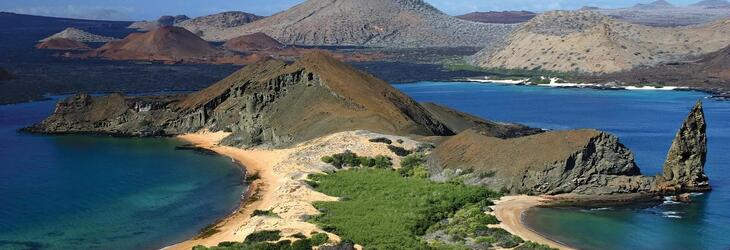The University of Toronto will offer one course in Ecuador, worth one full-year credit. The course has limited space and is contingent on adequate enrolment. Students will be in classes or on field trips every day, including weekends, except for travel days and some (minimal) free time during the program. Where possible, students will be involved in group research projects.
Admission to the course requires proof of swimming proficiency. Please see the Program Overview page for details.
ENV395Y0 Special Topics Field Course: the ‘Enchanted Isles’ - Ecology, Geography and History on the Galápagos Islands
Based on the ‘enchanted isles, Ecuador’s Galápagos archipelago, we will examine fundamental concepts in ecology, evolution, biodiversity, geology and conservation biology through lectures, excursions and fieldwork. Our studies in this unique place will highlight the intricate links between the marine and terrestrial realms. We will also explore how these biomes have both impacted humans and been impacted by humans. Suitable for all School of the Environment programs.
Prerequisites: none
Recommended preparation: ENV200H1 or equivalent, BIO120H or equivalent, ENV100Y5
Breadth Requirement = Society and Its Institutions (category 3) + Living Things and Their Environment (category 4)
2026 Course Outline and Itinerary
Instructors
Christoph Richter is an Associate Professor, Teaching Stream, in the Department of Biology at University of Toronto Mississauga, where he teaches courses on biodiversity, ecology, marine mammal biology, and the historical and ecological impacts of the Columbian exchange. His graduate studies at Memorial University of Newfoundland and Otago University in New Zealand focused on the influence of human activities on the behaviour of cetaceans. His current research projects investigate the ecology of urban coyotes, students’ perceptions of plagiarism, and the long-term impacts of team-teaching. Dr. Richter has taught field courses in the Bay of Fundy, Gulf of Maine, and Ecuador, and he has been a study leader on cruises to the Arctic, Haida Gwaii and the Antarctic.
Monika Havelka is an Associate Professor, Teaching Stream, in the Department of Geography, Geomatics and Environment at University of Toronto Mississauga, where she teaches courses on environmental science, waste management, experimental design, and restoration ecology. Her PhD from Western University was focused on reproductive energetics and population ecology of small mammals. Her current research projects investigate the ecology of urban coyotes, urban agroecology, and sustainability education. Prof Havelka has taught field courses in the low Arctic, the Canadian Rockies, Central Ontario, and in Ecuador, and she has been a study leader on cruises to the Arctic.
